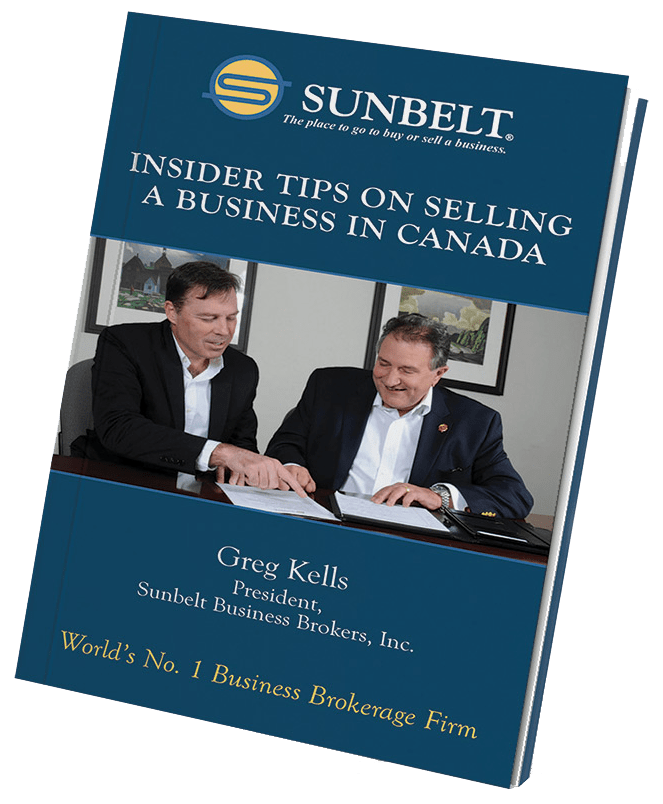If you own a small business and require a share freeze, partnership dissolution, or are starting to exit plan for the sale of your business, the first question owners often ask themselves is, “What is my company worth?” Most accounting firms provide business valuation services to answer this question. However, in our experience, they tend to misvalue small and medium-sized businesses.
The problem is that these firms are applying big company valuation methodology to small operations. They are too focused on the numbers and not enough on the company itself. Sometimes, they make the reverse error by focusing on the tax-reported numbers.
In this post, we’ll explore the details surrounding business valuations, including the proper method for your company and our process at Sunbelt Canada.
Key Takeaways
- Most often, a business owner will get a business valuation if they are retiring or looking to sell.
- Different companies are valued based on their size and various methods. What might work for a Fortune 500 company likely won’t work for a small business.
- Buyers may look at a business’s worth as different from the valuation.

Table of Contents
What is a Business Valuation?
A business valuation gives a company an absolute economic value. This final number can be reached in many ways, often with specific methods and formulas to determine an exact amount. It is often used to determine the list price of a business if the owner is looking to sell.
When Should I Get a Business Valuation?
At Sunbelt Canada, we perform an average of 1,000 small business valuations annually. Typically these companies have fewer than 100 employees, have revenue of $50,000,000 or less, and are privately owned. Most valuations we do are for exit planning or the sale of a business. In either case, we recommend that you begin well in advance.
The valuation will provide crucial information about the value drivers for your business. It will assist you in focusing on the activities that will have the greatest ability to increase value. Some of these may relate to restructuring to increase salability or reduce taxes. Depending on the specific factor, they might take years to complete and be effective. However, others can be implemented quickly and are effective almost immediately.
A formal appraisal can also provide the necessary valuation to buy out a partner or split assets in a divorce, for estate planning, an asset freeze for tax planning, or roll over into a family trust.
Insider Tips on Selling a Business in Canada Selling a business is complicated. You need a professional who can walk you through the minefield of details.
Types of Business Valuations
There are many valuation methodologies that work for various types of businesses. We use 14 different procedures at Sunbelt Canada. These include the following:
- Market Capitalization: The total value of a publicly traded company’s outstanding shares, calculated by multiplying the current share price by the number of shares available to buy.
- Times Revenue Method: This approach estimates the value of a company based on taking its yearly revenue and multiplying it by a factor, such as three or four times the revenue. This multiple depends on the business and industry.
- Earnings Multiplier: Uses earnings, like profit or income, multiplied by a factor to estimate the company’s overall worth.
- Book Value: This is the net worth of a company — the value of everything the company owns (assets) minus what it owes to others (liabilities), as recorded in its financial books.
- Liquidation Value: The estimated amount that could be realized by selling a company’s assets and paying off debts quickly. This method is commonly used for business dissolution or bankruptcy.
There are also several different methods to consider that might incorporate various formulas but look at similar data sets. These might be based on the following:
- Discounted Cash Flow (DCF) method: This assesses a company’s value by forecasting future cash flows and then discounting those cash flows back to present value using a chosen rate of return (discount rate).
- Earnings-based method: This determines the value of a company based on its earnings or profits. It can involve different metrics like Earnings Multiplier or Price-to-Earnings (P/E) ratio.
- Asset-based method: This involves assessing a company’s value with the value of its assets by subtracting total liabilities from total assets to determine the net asset value.
- Multiples analysis method: Compares the financial metrics of a business, such as earnings, book value, or revenue, to other similar companies in the same industry or market. This comparison helps determine a fair valuation multiple to apply to the company being evaluated.
- Net book value method: Determines the company’s value by subtracting the total accumulated depreciation and outstanding liabilities from the value of its assets.
- Scorecard valuation method: Often used for startups or early-stage companies and involves assigning scores to various factors, like the management team, market potential, and competitive advantage, to calculate the company’s value.
- Venture capital method: Often used by venture capitalists to value startups. This method estimates the company’s potential future exit value based on expected returns and expected time to exit, then discounts it back to present value.
- Berkus method: Another startup valuation approach that determines value based on potential, not performance. It assigns a specific dollar value to key elements, such as the quality of an idea, the skill of the team, the prototype’s progress, and market potential.
- Risk factor summation method: This method evaluates a company by assessing risk factors associated with its business, market, and financials. Each risk factor is assigned a score, and the cumulative score influences the final valuation.
Market-Based Methods
The valuation that we have found to be most appropriate for small businesses is the market-driven one. This methodology works similarly to how realtors appraise a house. It requires access to a reasonable sample of done deal transactions, but it is often the most reliable and accurate valuation for these companies.
If you consider the real estate scenario where the list price hinges on what houses sell for in this or a similar area, your realtor then adjusts for differences. They could look at the cost to build or value per square foot. For the most part, nothing will be more accurate than looking at sales of similar houses in the neighbourhood.
Which Valuation Method Should I Use?
Generally, this depends heavily on the kind of broker you are working with. They might have methods that continue to work for them in certain industries or regarding unique companies. While we prefer the market-based approach, you may be interested in exploring an assets-based approach if your business is more niche and focuses on different services. Ultimately, you’ll need to consider why you are doing the valuation in the first place and what you hope to achieve once you know the final number. We can help you decide on the right valuation methods.
Business Valuation Considerations
It is worth noting that different methods will provide different valuations. In addition, these are simply guidelines to view the overall economic value of your business, a snapshot rather than the complete picture.
For example, most small business owners and their accountants do their financial reporting and tax returns to minimize the tax payable. As a result, they may run discretionary expenses throughout the business. Discretionary could mean expenses that are not necessary to support the business’s revenue. These might include travel and entertainment, health and life insurance, automobile expenses, payments to the owner or their family members, and much more.
How Sunbelt Does Business Valuations
At Sunbelt Canada, we start by formally appraising the value of the business to determine fair market value (FMV). From the FMV, we determine the most probable selling price (MPSP). This calculation represents a reasonable price, factoring the true (recast) earnings past and future, what the market is willing to pay, and motivation. The seller can then negotiate on an informed basis.
Recasting Financials
The first step in our valuation process is to recast financials to determine what the business actually makes the owner. Recasting provides a realistic value of assets and liabilities and shows the true earning capacity of the business. This process includes removing depreciation, amortization, taxes, and interest and then revaluing current assets. We start by working with the business’s accountant to understand what is included in each line of the financials. From there, it will shift to focus on the owner to determine accurate discretionary expenses.
Our team typically requires three to five years of a company’s financial records to review. This gives an accurate perspective during the recasting process and is critical to understand the real benefits of ownership.
Recasting the Balance Sheet
The recast balance sheet should reflect the Fair Market Value (FMV) of the assets and liabilities being transferred.
While net book value is used for tax purposes, their value as is, in use, in place, is more relevant here for tangible assets such as furniture, leasehold improvements, vehicles, machinery, etc. Intangible assets– goodwill, patents, trademarks, database/mailing lists, licenses, permits, and franchise agreements – should also be recast to FMV.
Only after recasting can we look at industry benchmarks to analyze performance against similar businesses, then identify the value drivers and begin the process of valuing a business.
Benchmarking
Once we have completed the recasting, we review specialized databases. Each has more than 40,000 transactions recorded over the past 40 years. Our team contributes to these directories and subscribes to their use.
We start by looking at industry and size, and from here, we can determine what an average business in your sector of similar magnitude sells for. This is based upon a multiple of revenue, a multiple of EBITDA (Earnings Before Interest, Taxes, Depreciation, and Amortization), and a multiple of Seller’s Discretionary Earnings (SDE).
We then analyze your company concerning many factors which affect value. These include, but are not limited to, the following:
- Owner dependency
- Client loyalty
- Customer retention
- Marketing systems
- Operating systems
- Recruiting and training programs
- Competition, location
- Condition of facilities and equipment
- Pending changes that will affect your business
- Supplier relationships
- Revenue collection systems
- Revenue forecast for the next five years
Our database research and the above details allow us to put together a benchmark that adjusts based on our original calculations. These final changes can be considerable – they may double or reduce a value by half.
Although we have concluded a typical company valuation, we are not finished. Using the determined value and the revenue forecasts for the next five years, our team now develops pro forma financials for the coming five years. This helps to structure a deal based on our determined market value.
Potential buyers can clearly see a down payment amount, lender financing and costs, and seller financing and costs. If this draws in buyers, the valuation is successful. If it has not, we go back to the drawing board to see where we went wrong.
Considering Other Factors
There is much more to take into account than simply recasting and benchmarking. At Sunbelt Canada, we ask deeper questions like does the year-end represent the normal level of inventory? The value of the inventory is a topic of its own, the method of accounting used and its proper application affects the cost of sales and, of course, the earnings.
The operating and accounting systems, employee training and loyalty programs, marketing collateral and programs, customer retention, applicable gross margins and pricing systems, mix of commercial and consumer work, location and factors affecting future market growth, availability of good employees, competition and differentiators, niche focus of the service centre, etc., all affect the value and saleability of the business.
The structure of the sale and the willingness of the owner to finance some of the purchase price are other major factors.
Things to Remember About Recasting
Although recasting is a standard practice in business valuation, it can take some time for buyers and sellers to adjust to the concept. A fair representation of the business is essential to both parties:
- Sellers need to understand that these are valuation documents, not tax-deriving, and that, all things being equal, a better bottom line will lead to a higher business valuation.
- Without recasting, an owner may understate cash flow from operations, arriving at an asking price for their business that is too low.
- A buyer needs confirmation that the adjustments to earnings are real. They need the validation that the cash flow is sufficient to pay their salary, service the debt incurred to buy the business, and build or reinvest in the business to provide a reasonable return on their invested capital.
A Recasting Example
Let’s look at an example of a fictional auto service centre – Andy’s Auto Service – recast to uncover true earnings (Sellers Discretionary Earnings/SDE*). The company’s income statement shows gross profit is $300,000, based on revenues of $750,000 and cost of sales of $450,000. After subtracting operating expenses of $298,000, the company’s pre-tax profit is $2,000. Would that interest a buyer?
*SDE is net income less: interest; taxes; depreciation and amortization; owner’s compensation (including salary and discretionary expenditures).
With recasting, operating expenses were normalized to $107,500. It’s not that certain expenses aren’t legitimate — it’s whether or not they’re essential for the next owner. Sometimes, we need to add back discretionary expenses that an owner hasn’t included, such as: a family member who works for no pay, an owner who uses his own tools, unrecognized expenses, or where a business is uninsured or under-insured.
In our example, the true earnings were determined to be $109,500, proportionately more in line with the 15 to 25% of gross sales that SDE typically represents in a small (four to six-bay) auto service centre.
The EBITDA in this example is $59,500, as we would have to add back the cost of a replacement for the owner at a fair market wage estimated at $60,000.
A Business Valuation Example
Previously, our brokerage worked with someone interested in purchasing a dry cleaning company. So, we did a valuation of two dry cleaners. Company A had revenue of $1,200,000 and an EBITDA of $600,000. Company B had a revenue of $1,200,000 and an EBITDA of $325,000. We valued B higher than A. Here is our reasoning:
- Company A had senior staff and obsolete equipment. The operation looked at significant capital expenditures and derived much of its business from hotels, but this depended heavily on tourism.
- Company B had new environmentally sound systems, equipment, and technology and employed young, well-trained staff. It was the most significant player in its small market, having many good commercial clients and good outlets.
The buyer who was considering both doubted our valuation based on numbers alone. The individual ended up buying Company A, but the following year saw a major decline in tourism and thus business for the dry cleaner he purchased. Earnings fell to just $100,000. Meanwhile, Company B’s profits increased by $25,000 annually for the next five years.
In Summary
If you are interested in knowing what your business is worth, reach out to your local Sunbelt broker’s office. All our business analysts are well-trained and excellent at what they do. We have invested in the tools, resources, and skills necessary to help you get the most accurate valuation based on your goals. Our focus and our experience are in small, privately held businesses.
We have 30 locations across the country and are proud to say that we sell more businesses than anyone in Canada. This means we have the experience to get your company bought or sold with ease. Contact us today to get started and see what your business is worth.




